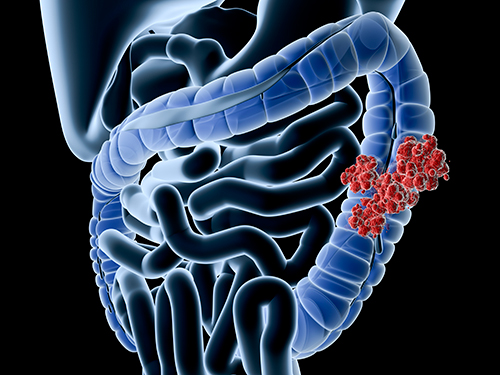
Four important signs and symptoms of early-onset colorectal cancer have been pinpointed in a study of insurance data by researchers at Washington University School of Medicine in St. Louis. They found that, between three months and two years before diagnosis, abdominal pain, rectal bleeding, diarrhea, and iron deficiency anemia each indicate increased risk in people under the age of 50. Having a single one of these symptoms almost doubled the risk, having two symptoms increased risk by more than 3.5 times, and having three or more boosted the risk by more than 6.5 times.
The study appeared today in the Journal of the National Cancer Institute. The co-first authors are Cassandra D.L. Fritz, MD, an assistant professor of medicine in the Division of Gastroenterology, and Ebunoluwa Otebeye, MD, a general surgery resident.
The number of young adults with colorectal cancer has increased in recent years. It’s estimated that now nearly one-third of rectal cancer patients are younger than age 55. Individuals born in 1990 or after have double the risk of colon cancer and four times the risk of rectal cancer compared with people born in the 40 years prior.
As with most malignancies, early detection is crucial for patients with colorectal cancer. But since younger patients do not undergo regular screening, their diagnoses may be delayed.
“It usually takes about three months to get a diagnosis from the time a person first goes to the doctor with one or more of the red-flag signs and symptoms we’ve identified,” Fritz said. “But in this analysis, we found that some young adults had symptoms for up to two years prior to their diagnoses. That may be part of the reason many of these younger patients had more advanced disease at the time of diagnosis than what we normally see in older people who get screened regularly.”
This team used data from the IBM MarketScan Commercial Database to look at more than 5,000 patients with early-onset (prior to age 50) colorectal cancer and matched controls. This database provides longitudinal, de-identified information based on health insurance claims data from about 113 million insured adults ages 18 to 64.
They found that two symptoms in particular—rectal bleeding and iron deficiency anemia—point to the need for timely endoscopy and follow-up.
“Colorectal cancer is not simply a disease affecting older people; we want younger adults to be aware of and act on these potentially very telling signs and symptoms,” said senior author Yin Cao, ScD, an associate professor of surgery in the Public Health Sciences Division, and a research member of Siteman Cancer at Barnes-Jewish Hospital and Washington University School of Medicine.
“Since the majority of early-onset colorectal cancer cases have been and will continue to be diagnosed after symptom presentation, it is crucial to recognize these red-flag signs and symptoms promptly and conduct a diagnostic work-up as soon as possible,” Cao said.
He added that, “It’s also crucial to spread awareness among primary care doctors, gastroenterologists and emergency medicine doctors. To date, many early-onset colorectal cancers are detected in emergency rooms, and there often are significant diagnostic delays with this cancer.”












